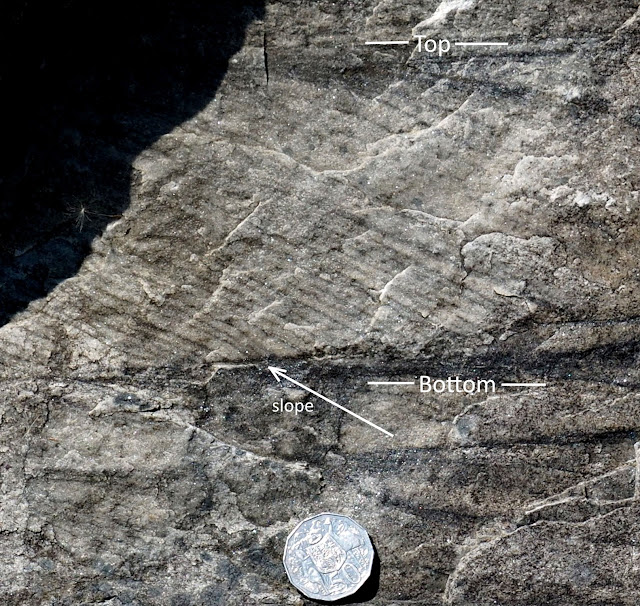You know how they say, “don’t leave home without it”? Well, to see this piece of geology, you will need to leave home, because cross bedding is only found in the outdoors, and it is the result of the angle of rest acting, many years ago.
A lesson in geological showmanship: I spent quite a few years as a visiting scientist, working with kids in K-6. I
got my young audience interested when I sat on an outcrop of cross bedded
sandstone and said, “I’m sitting on a 250 million-year-old fossil.” Of course,
they wanted to know why and how I knew this, and I had them in the palm of my
hand.
Cross bedding in a cutting in Hickson Road. The horizontal bed below tells us these are not tilted strata.
I produced my Vegemite jar angle of rest measurer (you can see it here), and explained that my seat was a fossil sand bank.
Because we were all in Sydney, where the dominant feature is Triassic
Hawkesbury sandstone, I knew the approximate age. The end result was that they
started to see the cross bedding that was visible in their school grounds.
The cross bedding
is set up when sand is pushed sideways, like the Sahara dune, seen here.
That dune was pushed along by wind, but most cross bedding is formed by the
pushing of water. As sand reaches the front of a sand bank, and tumbles down
the slope, the sand starts to pile up at the bottom, and a new thin layer
forms. Once this layer reaches the top, a new layer starts to form, on top of
and in front of the last one.
Cross bedding in a
cliff at Malabar, Sydney (inset: close-up), and in a road cutting at Fairlight,
Sydney.
Some cross bedding lasts a long time. This picture below
shows quartzite, seen in Norway. Quartzite is a metamorphic rock, formed when
sandstone is buried under huge amounts of other rock, heated and squashed—yet
the cross bedding still persists. That takes a long time!
Once you know what you are looking for, cross bedding can turn up anywhere. Always look for horizontal beds, above and below a series of sloping beds.
Cross bedding in
quartzite, Norway.
Tilted and folded beds like these, seen on
Mt Pilatus in Switzerland do not show
cross bedding.
Science is like that: just when you think you have it all
worked out, something changes. Then again, many animals seem to have their own
environments worked out.
Svartifoss, (“Black Waterfall”) in Iceland.
These aren’t beds either: look up “columnar basalt”.
To search this blog, use this link and then use the search box
Another way: use the index!










No comments:
Post a Comment